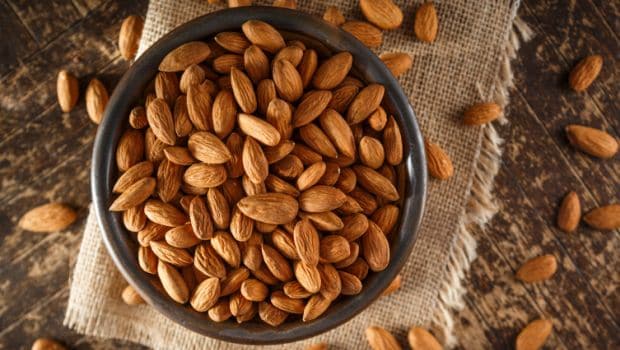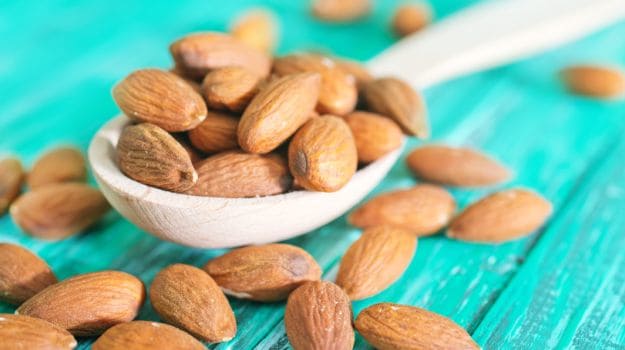Almonds are tear-shaped seeds of trees native to the Mediterranean region but are today cultivated across the world. It consists of an outer shell with the seed within. Almonds have been a part of the Indian diet for centuries. They are used in both savoury and sweet dishes. Almonds with milk before sleeping, almonds with khus as thandai and, of course, almond thandai with bhang for Holi - almonds play an essential part of our lives. Almonds are popular because of the health benefits that they have to offer. Full of health promoting nutrients, these tiny crunchy wonders are a treasure trove for all ages.
(Also Read: Why Soaked Almonds are Better Than Raw Almonds)
Nutrition In Almonds: One Ounce (28.34 Grams Approx.) Of Almonds Contain The Following:
| Almonds - 28 grams | |
|---|---|
| Energy | 170.5Kcal |
| Carbs | 0.84g |
| Protein | 5.15g |
| Fat | 16.35g |
| Fibre | 3.8g |
| Folates | 10.2mcg |
| Vitamin E | 7.24mg |
| Calcium | 63.84mg |
| Magnesium | 89.04mg |
| Phosphorus | 124.88mg |
| Potassium | 195.72mg |
| MUFA | 10,724mg |
| PUFA | 3700mg |
| SAT FATS | 1220mg |
Nutritionally, almonds are calorie dense but they bring so much health benefits with them. Intake of these nutty delights has a massive positive effect on our health beyond just cholesterol control. They are a rich source of vitamin E, manganese, magnesium, copper, phosphorus, fibre, riboflavin, monounsaturated fatty acids and protein.
(Also Read: Here's How You Can Chop Almonds Like A Pro)

Calories in almonds: Almonds have been a part of the Indian diet for centuries.
Health Benefits Of Almonds:
Energy Refill
Just one ounce of almonds provides 170 calories with very low carbs and lots of protein. The fat content also adds to the energy quotient. Energy from almonds is a slow release process, keeping the satiety for a longer period and also helping in preventing sugar and insulin spikes in the blood.
Good Fats
Fats in almonds constitute almost 50% but the quality of fat is excellent. Primarily composed of Monounsaturated fats (MUFA), they are a source of healthy fats, which contributes to its favourable hypocholesterolaemic effect. They have a positive effect in lowering LDL (bad) cholesterol in individuals with high cholesterol levels and in diabetics.

Calories in almonds: Fats in almonds constitute almost 50% but the quality of fat is excellent.
Regulates Cholesterol
Minerals like magnesium, copper, manganese, calcium and potassium are key elements for health. Magnesium is linked to maintaining the electrical properties of the heart in addition to relaxing muscles and helping nerves send signals. Copper is an important part of the antioxidants and helps prevent oxidation of LDL and HDL.
Manages Diabetes, Lowers Blood Pressure And More
It also plays an important role in diabetes management and prevents mitochondrial damage, which helps slow the ageing process. Calcium is essential for bone health while potassium reduces the risk of stroke, lowers blood pressure, protects against loss of muscle mass, preserves bone mineral density, and reduces the formation of kidney stones.
Prevents Cognitive Decline
Vitamins found in almonds include riboflavin, which along with amino acid L-carnitine, also present in almonds, make it a brain food that prevents cognitive decline and improve neurological activity.
(Also Read: Almonds For Weight Loss: Load Up On These Nuts To Lose Weight)

Calories in almonds: Almonds are brimming with good amount of vitamin E.
Good For Skin And Hair
Almonds are brimming with good amount of vitamin E. It is an important vitamin for our vision and reproductive health and for our blood, brain and skin as well. Vitamin E also acts as an antioxidant, fighting free radicals that damage our body at cellular level. By helping reduce inflammatory processes, vitamin E also helps prevent ageing, improving the skin and hair. It also has an important role in balancing hormones in our body.
Facilitates Weight Loss:
Almonds are packed with insoluble fibre. Fibre, as we know, is beneficial for digestive health; it prevents constipation and the insoluble fibres act as probiotics in improving the gut flora. Fibre is also associated with managing diabetes and reducing risk of heart-related diseases. Fibre also adds early satiety to our food preventing overeating, thereby, aiding weight loss. Dietary fibre also protects against cancers of the colon, breast, oral, and small intestine.
If consumed as a snack, almonds may benefit diabetics too. Almonds are known to lower the glucose response after ingestion. This also helps reduce unwanted hunger pangs and you eat reasonably during meals too.
Almonds are truly the star of all nuts; but too much of a good thing can also be bad. Therefore, control your portion sizes, stick to an ounce a day (which is 28g approx.) - 25 almonds. Ideally, they make a great snack time treat; you can also take them post workout, at bedtime or early in the morning - the choice is yours! So, without further ado, let's involve in this nutty affair.
Disclaimer:
The opinions expressed within this article are the personal opinions of the author. NDTV is not responsible for the accuracy, completeness, suitability, or validity of any information on this article. All information is provided on an as-is basis. The information, facts or opinions appearing in the article do not reflect the views of NDTV and NDTV does not assume any responsibility or liability for the same.
About Rupali DattaRupali Datta is a Clinical Nutritionist and has worked in leading corporate hospitals. She has created and lead teams of professionals to deliver clinical solutions for patients across all medical specialties including critical care. She is a member of the Indian Dietetic Association and Indian Association of Parenteral and Enteral Nutrition.







